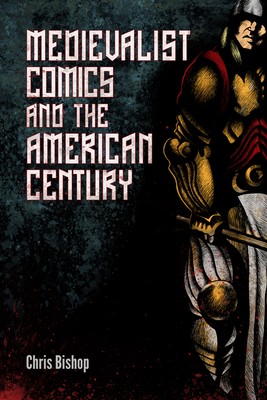
- We will send in 10–14 business days.
- Author: Chris Bishop
- Publisher: University Press of Mississippi
- Year: 2016
- Pages: 233
- ISBN-10: 1496808509
- ISBN-13: 9781496808509
- Format: 15.2 x 22.9 x 1.8 cm, kieti viršeliai
- Language: English
- SAVE -10% with code: EXTRA
Reviews
Description
From its genesis in the 1930s to the present, Bishop surveys the medievalist comic, its stories, characters, settings, and themes drawn from the European Middle Ages. Hal Foster's Prince Valiant emerged from an America at odds with monarchy, but still in love with King Arthur. Green Arrow remains the continuation of a long fascination with Robin Hood that has become as central to the American identity as it was to the British. The Mighty Thor reflects the legacy of Germanic migration into the United States. The rugged individualism of Conan the Barbarian owes more to the western cowboy than it does to the continental knight-errant. In the narrative of Red Sonja, we can trace a parallel history of feminism. Bishop regards these comics as not merely happenchance, but each success (Prince Valiant and The Mighty Thor) or failure (Beowulf: Dragon Slayer) as a result and an indicator of certain American preoccupations amid a larger cultural context.
Intrinsically modernist paragons of pop-culture ephemera, American comics have ironically continued to engage with the European Middle Ages. Bishop illuminates some of the ways in which we use an imagined past to navigate the present and plots some possible futures as we valiantly shape a new century.
EXTRA 10 % discount with code: EXTRA
The promotion ends in 23d.09:38:27
The discount code is valid when purchasing from 10 €. Discounts do not stack.
- Author: Chris Bishop
- Publisher: University Press of Mississippi
- Year: 2016
- Pages: 233
- ISBN-10: 1496808509
- ISBN-13: 9781496808509
- Format: 15.2 x 22.9 x 1.8 cm, kieti viršeliai
- Language: English English
From its genesis in the 1930s to the present, Bishop surveys the medievalist comic, its stories, characters, settings, and themes drawn from the European Middle Ages. Hal Foster's Prince Valiant emerged from an America at odds with monarchy, but still in love with King Arthur. Green Arrow remains the continuation of a long fascination with Robin Hood that has become as central to the American identity as it was to the British. The Mighty Thor reflects the legacy of Germanic migration into the United States. The rugged individualism of Conan the Barbarian owes more to the western cowboy than it does to the continental knight-errant. In the narrative of Red Sonja, we can trace a parallel history of feminism. Bishop regards these comics as not merely happenchance, but each success (Prince Valiant and The Mighty Thor) or failure (Beowulf: Dragon Slayer) as a result and an indicator of certain American preoccupations amid a larger cultural context.
Intrinsically modernist paragons of pop-culture ephemera, American comics have ironically continued to engage with the European Middle Ages. Bishop illuminates some of the ways in which we use an imagined past to navigate the present and plots some possible futures as we valiantly shape a new century.


Reviews